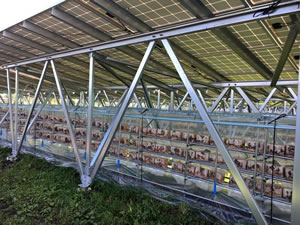Can mushrooms and solar power fill Japan's vacant farmland?
 Nikkei Asian Review: Farmers in Japan could be in for a windfall if a new practice of combining agriculture with solar power generation takes root.
Nikkei Asian Review: Farmers in Japan could be in for a windfall if a new practice of combining agriculture with solar power generation takes root.
Converting idle land to solar power generation has often been touted as a solution to rural Japan's woes, but restrictions have often proved a hurdle. A reduced feed-in tariff has discouraged many newcomers -- both businesses and individuals -- entering what was once seen as potential gold mine.
But in 2013, the Japanese government partially relaxed restrictions on the use of farmland for solar power generation, provided it was simultaneously used for agriculture.
Now, with help from Sustainergy, a Tokyo-based renewable-energy startup, Hitachi Capital and homebuilder Daiwa House Industry aim to generate a combined 4,000 kilowatts of solar power at two locations in northeastern Japan. The 2,000kw produced at each plant represents the largest output of any such facility in the country.
The output will be sold to Tohoku Electric Power and could fetch an annual 140 million yen ($1.27 million). The land underneath the panels, meanwhile, is expected to yield an annual 40 tons of cloud-ear mushrooms -- a crop that requires little sunlight.
Most commercially available cloud-ears in Japan are imported from China, and it is hoped there will be ample demand for the home-grown kind.
A total 1.2 billion yen will be spent on setting up the facilities in Miyagi Prefecture, which are set to come online at the end of September. Full Article:
Comments (0)
This post does not have any comments. Be the first to leave a comment below.
Featured Product


